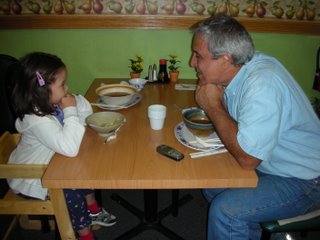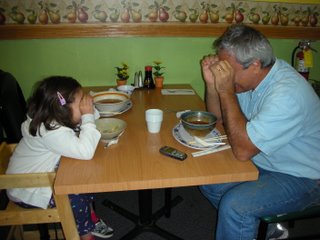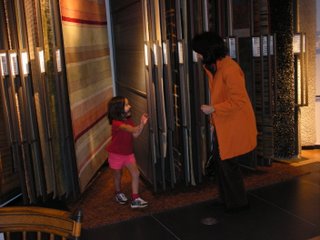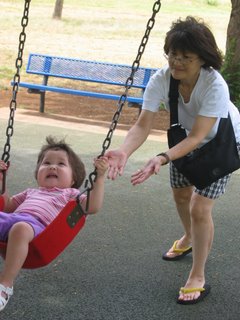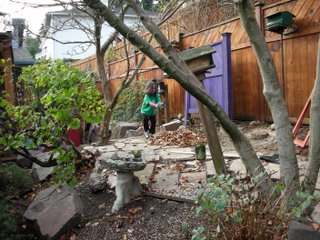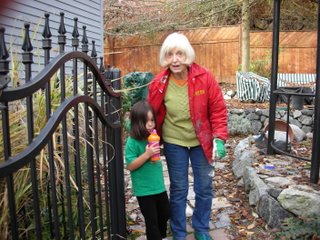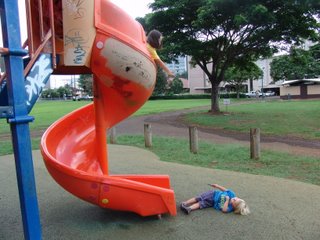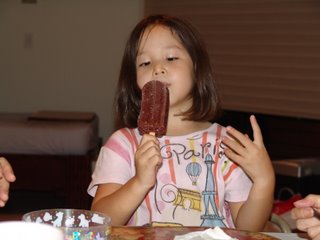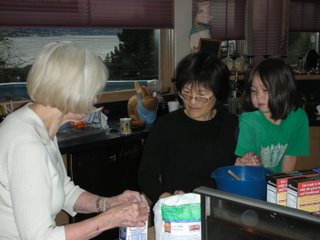
“And 1 ½ to 1 ¾ cups of heavy whipping cream.”
“How do you know whether it’s 1½ or 1¾?”
“Well, if you put too much in it you can’t roll it out.”
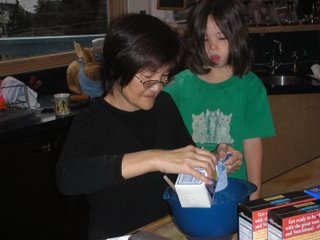
She was showing Kristina how to make biscuits the easy way. Kristina had combined 2 cups of self-rising flour and a tablespoon of sugar and was now adding in the cream.
“Does it matter how much I stir it?” Kristina was asking.
“There’s no harm in stirring it,” Mother said.
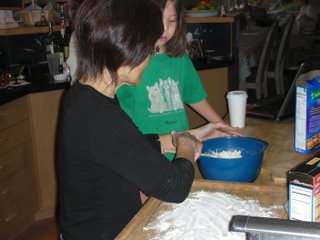
“Now you’re going to knead it,” she said. “You don’t want to do it too many times. About seven times.”
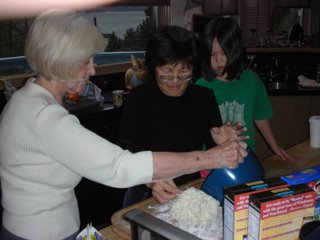
Maia counted out to seven.
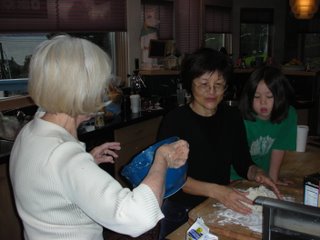
“Now you’re going to roll it out. Roll it out to about a half inch thick.”
“That’s good,” she said, as Kristina finished.
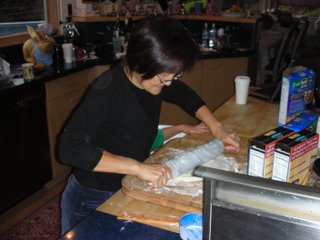
“Now we’re gonna get a biscuit cutter and when you cut cut straight down don’t go like that,” Mother said, making a twisting motion with her hand.
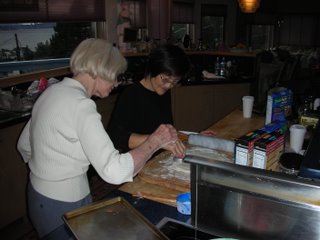
“Don’t pat ’em down,” she said. “Just put ’em all together.”
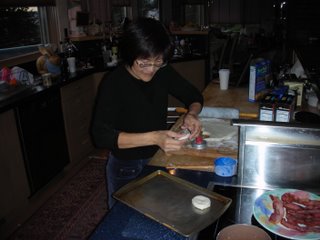
“Did you eat like this when you were growing up?” Kristina asked.
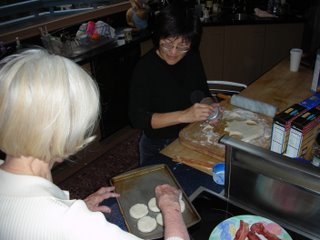
“Yes, that’s what mother did every morning. Built a fire every morning and baked biscuits. It wasn’t easy. Until we got an electric stove. I was about 10 or 11. That was a big thrill to mother.”
Mother was frying bacon and sausage for the gravy.
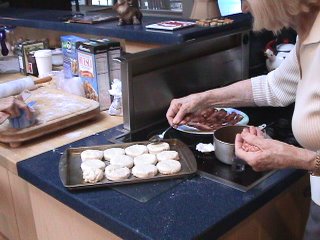
She put a little bacon fat on the tops of the biscuits.
"This will give them some taste," Mother said.
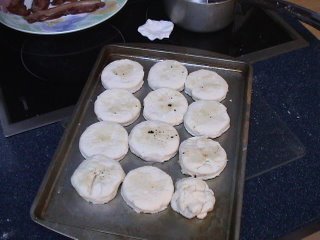
“Where were you living?” I asked.
“When we got the stove? We were living in Welch. The big city,” she said, smiling. Welch was actually a small town, even then, but it seemed big to a family moving from Newhall and War.
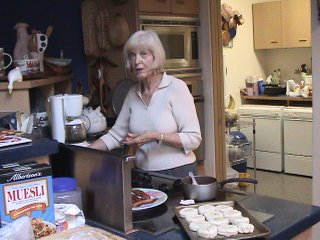
“What did you burn, Mother?”
“Wood. And coal. But electric stoves were just coming out,” she said, still thinking about her mother and the electric stove. “Not everybody had one.”
“Where did you get the stuff to burn, Mother?” I asked.
“Well, we lived out in the country. Bernard would go out and chop wood. And we’d use coal, too.”
“Where did you get the coal?” I asked.
“We bought it. And they delivered it, too. When we moved to Welch, we had a long coal chute that came down the hill alongside the steps. They went from one street to another up the side of that hill.”
She thought a little.
“That’s where that guy fell down those long steps and into our coal bin. Remember where I showed you that?” she asked. We had gone back to the street in Welch where her family had moved when they had left War. The houses were still there, though some of them were abandoned and had begun to fall apart. The houses were duplexes, tiny little things.
She was smiling now, thinking about it.
“He was coming down those steps and I was outside watching him. It was suspenseful. Mother always, ‘He’s gonna kill himself one day going down those steps as drunk as he is,’ and I was watching to see if he would do it. Anyhow, he was coming down the steps, and he was holding his groceries. And then he fell down the steps, and rolled into the coal chute and fell all the way down the hill into our coal bin. And then this round thing came rolling to the end of the chute where I was. And it was red and white and all bloody, so I ran inside and said, “Momma, momma, he fell down the steps, and it tore his head off.” And Momma ran outside and looked, and laughed because it was his pork roast. He was still in the coal bin. Knocked himself silly. Drunk as a skunk.”
She laughed. We all did.
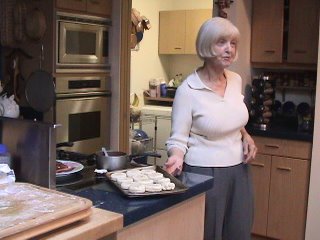
“Okay, now put ’em in at 500 for about 10 minutes. This is about the only time you bake at 500.”
“You don’t have to wait for it to rise?” Kristina wanted to know.
“You don’t have to. There’s no yeast in it. The baking powder makes it rise.”
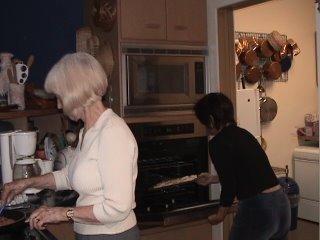
Kristina put the biscuits in the oven.
“Whatever happened to that guy?” I asked.
“The one who fell down the steps? Well, I don’t know. Inevitably, we moved, to Maple Terrace up there on that hill. It had all those steps,” she said, indicating the flights. “It seemed to us that Daddy just looked for steps for us to climb because we carried everything.”
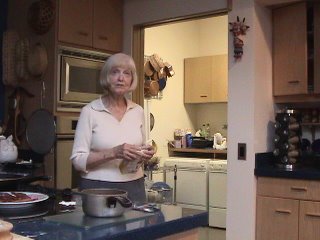
“Isn’t this fattening?” Kristina asked.
“Well, if you didn’t have the cream you’d have to cut in some kind of shortening—butter or lard. This is the easy way. If you’d made ’em the other way, the only difference is that you’d have to cut in the butter or the shortening. These are called cream biscuits cause you make them with cream. Sweet cream. They aren’t sweet, but they aren’t salty.”
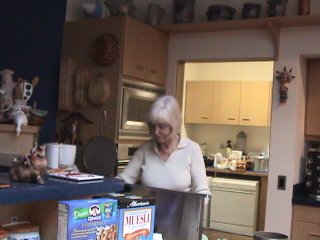
“How did you not gain weight before?”
“Well, life was a lot harder.”
Mother thought some.
“We used lard all the time when I was growing up. Everybody used lard. Lard makes better cake. Everything tastes beter with lard. But it’s fattening.”

“Lard is pork?”
“Unhuh. We used lard all the time. And streaked bacon.” Mother said it, “strea-ked,” with two syllables and the accent on the second one.
“When mother sent me to get streaked bacon, she always told be to get the bacon that had the biggest streaks in it. Mother cooked beans with it and collard greens, anything that needed fat in it. And I would go and ask for streaked bacon. They still have it but now they call it salt pork. That’s what I put in that soup.”
She had made some soup for us a few days ago. Very hearty and rich.
“So I would get a big block of streaked bacon and mother would slice it. As thin as she could, but she couldn’t get it really thin. About like that,” she said, showing a quarter inch of finger.
“She would roll it in flour and put salt and pepper on it and fry it. And it was really good. And we had that instead of having bacon like this.”
“Did she make gravy, too?”
“Oh, yes,” she said—“gravy and biscuits and eggs. We had good food.”

"Look at that," she said. "Kristina's first biscuits. They're beautiful."
The telephone rang. My brother was coming over along with my sister-in-law, who was going to take us out shopping. He had heard that Mother was going to make biscuits and gravy.
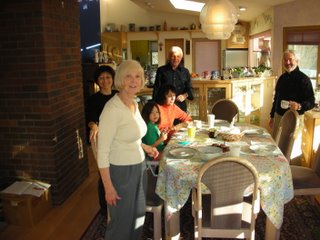
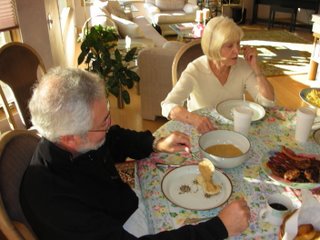
These images are all from this morning.
John, Tuesday, November 21, 2006

